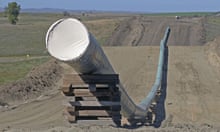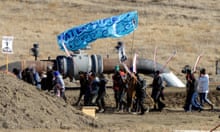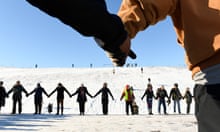Pope Francis appeared to back Native Americans seeking to halt part of the Dakota Access pipeline on Wednesday, saying indigenous cultures have a right to defend “their ancestral relationship to the Earth”.
The Latin American pope, who has often strongly defended indigenous rights since his election in 2013, made his comments on protection of native lands to representative of tribes attending the Indigenous Peoples Forum in Rome.
While he did not name the pipeline, he used strong and clear language applicable to the conflict, saying development had to be reconciled with “the protection of the particular characteristics of indigenous peoples and their territories”.
Francis spoke two days after a US federal judge denied a request by tribes to halt construction of the final link of the project that sparked months of protests by activists aimed at stopping the 1,170-mile line.
Speaking in Spanish, Francis said the need to protect native territories was “especially clear when planning economic activities which may interfere with indigenous cultures and their ancestral relationship to the Earth”.
The Standing Rock Sioux and Cheyenne River Sioux tribes have argued the project would prevent them from practicing religious ceremonies at a lake they say is surrounded by sacred ground.
“In this regard, the right to prior and informed consent [of native peoples] should always prevail,” the pope said, citing the 1997 UN Declaration on the Rights of Indigenous Peoples.
Thousands of tribe members, environmentalists and others set up camps last year on US army corps of engineers land in the North Dakota plains as protests intensified.
In December, the administration of Barack Obama denied the last permit needed by Energy Transfer Partners, which is building the $3.8bn pipeline.
But last week, the army corps of engineers granted a final easement, after Donald Trump issued an order to advance the project days after he took office in January.
The pope made an indirect criticism last week of another Trump project, a wall along the border with Mexico, saying society should not create “walls but bridges”.
Pope Francis, who wrote a major encyclical letter in 2015 on climate change and the environment, told the group that new technologies could be legitimate but had to respect the earth.
“Do not allow those which destroy the earth, which destroy the environment and the ecological balance, and which end up destroying the wisdom of peoples,” he said.









